- Clone
- 15G10 (See other available formats)
- Regulatory Status
- RUO
- Other Names
- Proteins are acetylated by the reversible transfer of acetyl-CoA to the ε-amino group of lysine
- Isotype
- Mouse IgG2b, κ
- Ave. Rating
- Submit a Review
- Product Citations
- 8 publications
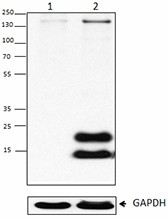
| Cat # | Size | Price | Save |
|---|---|---|---|
| 623401 | 25 µg | ¥22,220 | |
| 623402 | 100 µg | ¥47,960 |
Proteins are reversibly and dynamically acetylated on the ε-amino group of lysine by acetyltransferases and deacetylated by deacetylases. This post-translational modification can regulate protein function (interactions with other proteins and DNA binding). Histones and transcription factors (PCAF, p53, p300, etc) appear to be the major targets of acetyltransferases. Acetylation is usually associated with chromatin remodeling and transcriptional activation, although in some cases (telomeres) it is associated with gene silencing. The 15G10 antibody recognizes acetylated lysine residues on proteins.
Product DetailsProduct Details
- Verified Reactivity
- Species independent
- Antibody Type
- Monoclonal
- Host Species
- Mouse
- Immunogen
- Acetylated protein mixture
- Formulation
- This antibody is provided in phosphate-buffered solution, pH 7.2, containing 0.09% sodium azide.
- Preparation
- The antibody was purified by affinity chromatography.
- Concentration
- 0.5 mg/ml
- Storage & Handling
- Upon receipt, store between 2°C and 8°C.
- Application
-
WB - Quality tested
ICC - Verified - Recommended Usage
-
Each lot of this antibody is quality control tested by Western blotting. Western blotting, suggested working dilution(s): Use 5 µg antibody per 5 ml antibody dilution buffer for each mini-gel. For immunocytochemistry: Use a dilution range of 1-4 µg/ml. It is recommended that the reagent be titrated for optimal performance for each application.
-
Application References
(PubMed link indicates BioLegend citation) -
- Kuo HP, et al. 2010. Sci Signal. 3:Ra9. PubMed
- Product Citations
-
- RRID
-
AB_315967 (BioLegend Cat. No. 623401)
AB_315968 (BioLegend Cat. No. 623402)
Antigen Details
- Structure
- Proteins are acetylated by the reversible transfer of acetyl-CoA to the ε-amino group of lysine
- Function
- Post-translational modification of proteins by acetyltransferases and deacetylated by deacetylases to regulate protein-protein and protein-DNA interactions
- Biology Area
- Cell Biology, Chromatin Remodeling/Epigenetics
- Antigen References
-
1. Wang S, et al. 2004. Novartis Found. Symp. 259:238.
2. Legube G, et al. 2003. EMBO Rep. 4:944.
3. Chen LF, et al. 2003. J. Mol. Med. 81:549. - Gene ID
- 8850 View all products for this Gene ID
- UniProt
- View information about Acetylated Lysine on UniProt.org
Related Pages & Pathways
Pages
Related FAQs
Other Formats
View All Acetylated Lysine Reagents Request Custom Conjugation| Description | Clone | Applications |
|---|---|---|
| Purified anti-Acetylated Lysine | 15G10 | WB,ICC |
| PE anti-Acetylated Lysine | 15G10 | ICFC |
| Alexa Fluor® 647 anti-Acetylated Lysine | 15G10 | ICFC |
| PE/Cyanine7 anti-Acetylated Lysine | 15G10 | ICFC |
Customers Also Purchased
Compare Data Across All Formats
This data display is provided for general comparisons between formats.
Your actual data may vary due to variations in samples, target cells, instruments and their settings, staining conditions, and other factors.
If you need assistance with selecting the best format contact our expert technical support team.
-
Purified anti-Acetylated Lysine
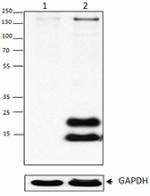
Western blot analysis of HeLa untreated (lane 1) and HeLa st... 
Untreated HeLa cells (upper panel), or overnight nocodazole ... -
PE anti-Acetylated Lysine
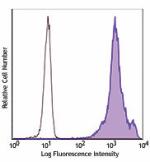
Human cervical carcinoma cell line, HeLa, was incubated with... 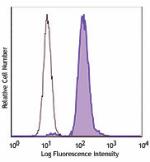
-
Alexa Fluor® 647 anti-Acetylated Lysine
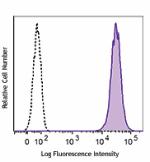
Human cervical carcinoma cell line, HeLa, was incubated with... 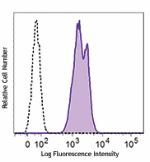
-
PE/Cyanine7 anti-Acetylated Lysine
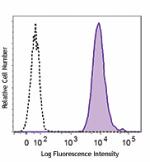
Human cervical carcinoma cell line, HeLa, was incubated with... 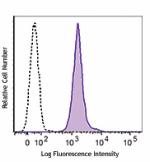







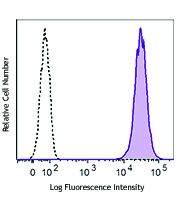
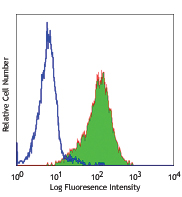

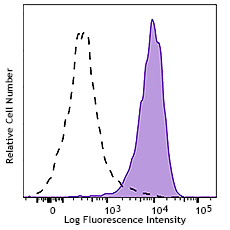







Follow Us